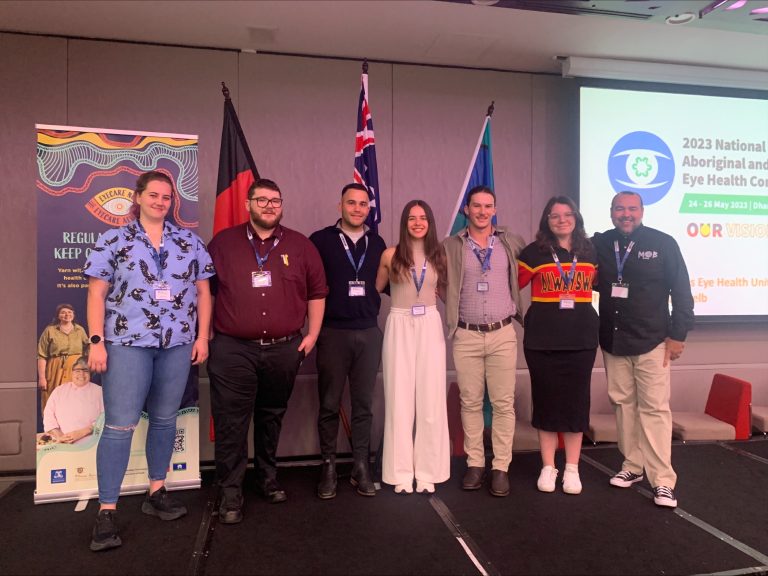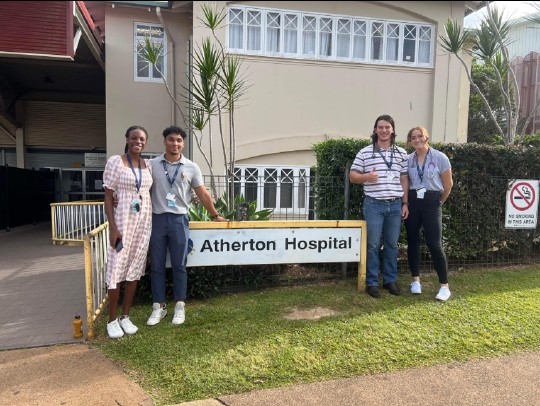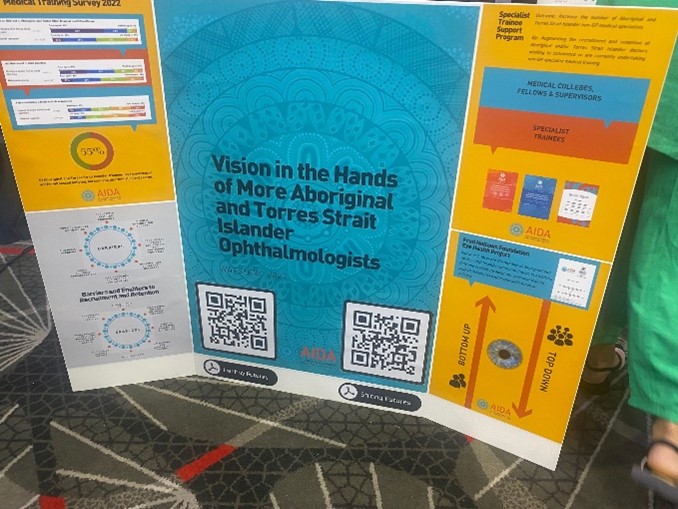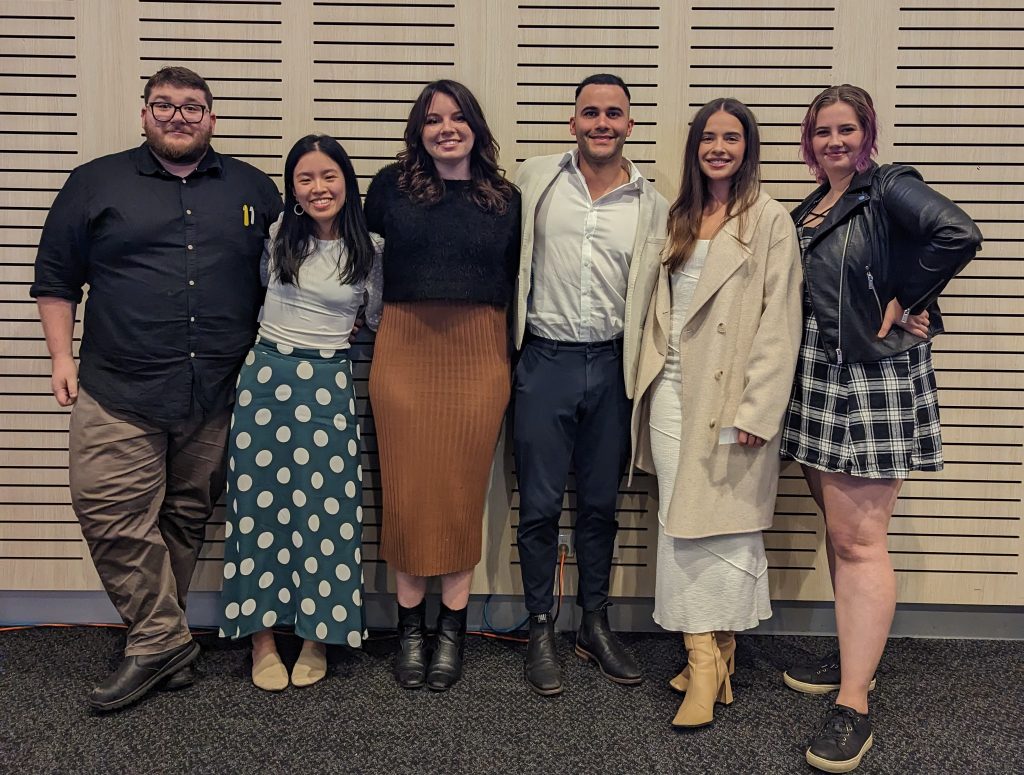The 2023 National Aboriginal and Torres Strait Islander Eye Health Conference took place on Dharug Country in Western Sydney at the end of May, with the theme Finding Our Voice – an extension of the 2022 theme Our Vision in Our Hands.
The aim of this Conference is to advance the collective work of the Aboriginal and Torres Strait Islander eye health sector towards the shared objective to improve eye health access and outcomes of First Nations Australians. Led by the National Experts Group on Aboriginal and Torres Strait Islander Eye Health (NEGATSIEH), the Conference was supported by the Indigenous Eye Health Unit (IEHU) at The University of Melbourne and co-hosted by the Aboriginal Health and Medical Research Council of NSW (AH&MRC).
More than 240 delegates—with more than 100 being First Nations delegates—participated in a rich and diverse three-day program of learning, reflection and connection, which focused on Aboriginal and Torres Strait Islander leadership and ownership of eye health. Delegates included representatives from Aboriginal Community Controlled Health Organisations and other primary care service providers, eye care clinicians, policy makers, researchers, non-government organisations, hospital staff, health and medical students, professional peak bodies and government departments.
Thanks to the generosity of donors, ANZEF offered scholarships for RANZCO trainees and First Nations medical students and doctors interested in Indigenous eye health to attend this year’s Conference. The six recipients were all medical students, who are undertaking studies at Curtin University, Deakin University, The University of Notre Dame (Sydney) and James Cook University. The Conference was a real eye-opener (pun intended!) for these students who are at various stages of their medical degrees, which typically contain little exposure to ophthalmology.
The following are some accounts of the Conference, which have been graciously provided by scholarship recipients.

L-R: ANZEF Scholarship recipients for NATSIEHC23 Acacia Steel, Samuel Holland, Rory Vocale, Sorren Thomas, Kyle Robinson and Piper Brown, with Shaun Tatipata – Co-Chair of the National Experts Group for Aboriginal and Torres Strait Islander Eye Health, which led the 2023 Conference.
“I received my first pair of glasses at the age of eight, which significantly impacted my academic experience. Prior to that, I was unfairly labeled as a disruptive student who intentionally neglected to pay attention in class. Teachers assumed that I derived personal satisfaction from disrupting others. It wasn’t until my parents realized that my lack of attentiveness might be due to poor vision that my love for learning truly began. Since then, I have developed a profound interest in the field of eye health.
However, it was only recently that I seriously considered a career in ophthalmology. Like many medical students, I subconsciously believed the stereotype that entering the field was reserved for those with a father in the field… Who had a father in the field… Who also had a father in the field. That was never on the cards for me.
Another reason for my hesitancy stemmed from observing my grandmother, my primary caregiver, gradually lose her vision. She never felt culturally safe enough to seek assistance, and witnessing her avoidable suffering deeply affected me. I often wondered how many other Marys were out there also losing their sight due to a lack of culturally safe eye care.
In reality, these concerns are interconnected: without First Nations ophthalmologists and culturally competent eye care professionals, the system cannot become truly inclusive and culturally safe. Without such transformation, it will be extremely challenging to attract First Nations individuals to pursue careers in ophthalmology. For this reason NATSIEHC23 has acted as a catalyst for my interest in pursuing a career in ophthalmology. This is because the conference showcased RANZCO’s active commitment to changing the culture of the field to ensure that individuals like my grandmother feel safe to come forward and seek the care they need to preserve their vision.
This fundamentally was the cornerstone of the conference for me. However, the conference was also extremely high yield because it departed from the conventional approach of presenting prescriptive healthcare research and instead provided a platform for Aboriginal and Torres Strait Islander individuals to share their personal experiences with eye care, or the lack thereof, and the practical interventions, developed by First Nations people, to enhance eye health within our communities.
Throughout the conference, I had the privilege of meeting numerous inspiring leaders, including A/Prof Rallah-Baker, as well as passionate optometrists and Aboriginal Health Workers who were all dedicated to improving Aboriginal and Torres Strait Islander eye health.
Therefore, I would like to express my sincere gratitude to ANZEF for sponsoring my attendance at this conference. It was the first conference I have ever attended where, upon its conclusion, I wished it had lasted longer, rather than simply feeling relieved that it was over. Considering its emphasis on providing practical solutions to enhance the eye health of First Nations peoples, I am determined to participate in as many future events as possible.
By prioritising practical improvements and inclusivity, RANZCO and conferences like NATSIEHC23 are paving the way for a future where every individual, regardless of their background, feels empowered to seek the eye care they require.”
“I am particularly interested in the intersection of culture and health, and in the ways in which Indigenous knowledge and practices can be integrated into modern health care systems. I believe that access to adequate eye health care is a fundamental right for all individuals, and that this right has not always been guaranteed for Aboriginal and Torres Strait Islander peoples. I am eager to contribute to efforts to improve Aboriginal and Torres Strait Islander eye health outcomes, and to work collaboratively with communities and stakeholders to promote health equity and social justice.
I attended the NATSIEH Conference in late May of 2023. Held over three days, the conference was an awesome experience, where attendees were able to listen and converse about eye health from an Indigenous perspective.
The conference encompassed a range of activities and featured outstanding speakers who shared their expertise and experiences in Aboriginal and Torres Strait Islander eye health. From engaging panel discussions to informative presentations, the conference offered a well-rounded program. Additionally, the inclusion of good food provided an enjoyable and conducive environment for networking.

The conference provided valuable insights into the challenges faced by Aboriginal and Torres Strait Islander communities in relation to eye health. It emphasized the need for culturally sensitive approaches, community engagement, and improved access to eye care services. Furthermore, the conference shed light on the impact of socio-economic factors, cultural beliefs, and historical factors on eye health outcomes. The insights I gained over the three days will help me and many other attendees to make a difference in Indigenous eye care. I am a person who enjoys relatable and touching stories over lectures, throughout the conference I was never bored and was constantly in a state of awe listening to many of the speakers. A highlight of the conference was a guest speaker who told his personal story with vision loss.
Attending the conference provided an excellent opportunity to network with other medical students, healthcare professionals, and attendees interested in Aboriginal and Torres Strait Islander eye health. By engaging in conversations and exchanging ideas with individuals from diverse backgrounds, I was able to
expand my professional network. These connections will be invaluable for future collaborations, knowledge sharing, and staying updated on advancements in the field.”
“Going to the NATSIEHC for me was an eye-opening experience for me. I had never thought much of going into ophthalmology, as you get very little experience and exposure in medical school. I also learnt a lot about simple pathways and organisations taking steps to improve Indigenous eye health that I have never been informed about before. It was a very inclusive conference with inviting also views and opinions, while learning from each other. I was worried at first, I would have nothing to contribute but everyone’s opinions were added and considered. I don’t think there was a single part of the conference I didn’t enjoy.
They key parts of the conference is coordinating the organisations goals for the future and promoting key health programs. There was something in every session for us students to learn something and get involved. There were delegates from around Australia but we were able to make some connections with professors from Melbourne University, the city I am studying and living in and Dr Kris Rallah-Baker, who is the first Aboriginal ophthalmologist.
I learned about the pathways for going into ophthalmology and what is available for future Indigenous doctors. My university doesn’t offer any ophthalmology placements so getting this experience and exposure was very helpful in getting a glimpse into what I could expect from the specialty and make connections to get some exposure to the actual clinical practice down the line. Even though this was my first conference it is something I am going to do much more of in the future and I hope to get as much understanding and connections as I got at this eye health conference.”
“Throughout my medical school education I’ve gained a deep appreciation for both the complexity of the eye as an organ, and the visual pathways within the brain. To me, vision is our most treasured sense as human beings; it is how we perceive artistic masterpieces, capture cherished memories, appreciate the beauty of our loved ones, and witness natural and man-made spectaculars. As a Torres Strait Islander woman I’m passionate about closing the health gap for our indigenous mob, and naturally am eager to one day contribute directly to the Indigenous eye health space.
The NATSIEHC was an invaluable opportunity to delve into the field of Indigenous Eye Care, particularly as a medical student with such limited exposure to ophthalmology. Witnessing the collaborative space that is holistic eye health care was truly admirable, and the cohesion between allied health and medical professionals was heartening. It was eye-opening to learn about the tireless work involved in providing comprehensive eye care to our Indigenous communities, and the passion of our Indigenous and non-Indigenous eye health care workers was nothing short of awe-inspiring. Connecting with other Indigenous medical students, all of us interested in ophthalmology, was the highlight for me. It already feels as though I’ve developed my own support network and community of future colleagues and friends, and that’s incredibly comforting.
In an added bonus, the exposure to a plethora of researchers means I’ve gained brilliant connections for my research prospects, all of whom were so friendly and eager to share. I’m forever grateful for the support of ANZEF in allowing me to attend this conference, I’ve come away with a beautiful sense of hope for the future of Indigenous eye care.”
“I had the privilege of being sponsored by the Australian & New Zealand Eye Foundation to attend the 2023 National Aboriginal and Torres Strait Islander Eye Health Conference held on Dharug country in Parramatta. Over the 3 days of the conference, I had the incredible opportunity of learning about the future of Eye health in communities around Australia by attending the First Nations Eye Health Alliance meeting for First Nations Delegates. I was inspired by the wisdom and knowledge of my Indigenous colleagues as we discussed what closing the gap in eye health would look like in our own communities. We established some core values and aims for the future and reinforced the Vision 2030 report developed from 2022.

I was able to gain many skills presented at the conference. I enjoyed the workshop on Retinal Screening in Primary Care as I received hands on experience using the equipment as well as running through various retinal images to determine whether they were normal or abnormal. Through the tabletop and oral presentations, I was able to discover programs in response to trachoma numbers in Western Australia. These programs piqued my interest as I have lived in the Pilbara previously and so felt close to home. By attending these presentations I was able to network with presenters and connect with them to see if there’s anyway I can become involved in the future.
It was so valuable to myself as I final year medical student to hear about the various pathways and programs that are being developed to increase to workforce for community eye health. I was able to network with representatives from AIDA to learn about the pathway into the Ophthalmology for Indigenous trainees as well as meeting a number of ophthalmologists who gave an insight into their experience and expertise. The conference also brought many Indigenous students together which provided an outstanding opportunity to meet likeminded people.
As I travelled from Perth, it is not often I have the opportunity to meet colleagues from the East Coast and here about the incredible research, community programs and pathways that are provided in other states and territories. The conference allowed me to see what is possible for my future as a clinician and those that are available to support my learning journey.”

L-R: Samuel Holland, AIDA Eye Health Project Officer Lili Chen, Piper Brown, Rory Vocale, Sorren Thomas and Acacia Steel.
We are so grateful to these recipients for sharing their experiences and to donors for making these scholarships possible.
ANZEF is the philanthropic arm of the Royal Australian and New Zealand College of Ophthalmologists (RANZCO).
RANZCO is a registered charity with the Australian Charities and Not-for-profits Commission (ACNC) Charities Services in New Zealand (registration no: CC53935).
Charity donations to ANZEF of $2 or more in Australia and $5 or more in New Zealand are tax-deductible.
ANZEF acknowledges and pays respect to the Traditional Owners of the lands and waters throughout the world, and to their Elders and ancestors, past and present.
© 2022 Web design and development by Marketing Media